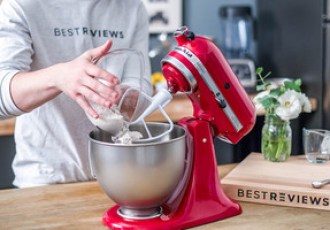We recommend these products based on an intensive research process that's designed to cut through the noise and find the top products in this space. Guided by experts, we spend hours looking into the factors that matter, to bring you these selections.

An integral part of waking up, coffee mugs are a part of most caffeine-loving households.
How do you decide which mugs to buy out of the many available choices? This can be tough, particularly if you’re looking for durable, high-quality coffee mugs that will last for years to come without costing the earth.

The first thing to decide when shopping for your new coffee mugs is the material you prefer. The most common options are ceramic, glass, metal, and plastic. Let’s take a look at the pros and cons of each.
Pros:
Metal coffee mugs are virtually unbreakable. They don’t chip or crack.
Many people like the simple look of plain stainless steel mugs.
Most metal coffee mugs hold heat well, particularly double-walled options.
Cons:
Metal coffee mugs have no real cons, except they’re not to everyone’s taste.
Pros:
Ceramic is the most common material for coffee mugs.
Coffee mugs made from ceramic can be painted or glazed with bright colors and intricate patterns.
Since ceramic is the most popular material for coffee mugs, you’ll find a huge range to choose from.
Thick ceramic coffee mugs hold heat well and are quite durable.
Cons:
Ceramic coffee mugs chip and break easily, especially if they are thin.
Pros:
Plastic coffee mugs are lightweight and very durable.
Cons:
Plastic coffee mugs can contain BPA, which leaches into drinks.
Coffee mugs made from plastic are far from environmentally friendly.
Plastic coffee mugs can add a bad taste to hot beverages.
Pros:
Glass coffee mugs are sleek and modern.
Glass can be recycled if your coffee mugs chip or you want a change.
Some people find it visually appealing to drink coffee from a glass mug.
Cons:
Glass coffee mugs don't hold heat effectively, so hot beverages will cool quickly.

The shape of a coffee mug is more than just an aesthetic concern.
Coffee mugs that taper, so they’re wider at the rim than they are at the base, cause the liquid inside to lose heat. This means your coffee will go cold faster in a tapered mug than in other coffee mugs.
Straight mugs and those that pinch in at the top are better at retaining heat, as well as directing the aroma of your coffee upward — ideal for coffee connoisseurs.
Coffee mugs come in many different designs. There really is something for everyone. You can find modern-looking mugs, quaint vintage-style mugs, and everything in between. A wide range of novelty mugs are also available.
Some coffee mugs are thick and sturdy, whereas others are thin and dainty. Thick mugs retain heat better, but thin mugs are more decorative.
You can find coffee mugs with a range of capacities, from tiny six-ounce cups to 24-ounce giants. However, most mugs have a capacity between 10 and 16 ounces.
The best capacity for you depends on how big a cup of coffee you like to drink. If you prefer small cups of coffee, an eight- or 10-ounce mug should do fine. But if you like to make a huge cup of joe to sip slowly, opt for a 16- or 20-ounce mug.
A single coffee mug can set you back as little as $1 to $2. For this price, expect to get a basic mug with a relatively small capacity.
A novelty mug or licensed mug generally costs between $15 and $25.
High-end coffee mugs from sought-after brands cost as much $25 to $50 per mug.
The cost of a coffee mug set varies depending on the number of mugs, the design of the mugs, and the manufacturer. Some sets of basic coffee mugs cost just $24 for 12 mugs.
Conversely, sets of brand-name coffee mugs can set you back as much as $100 for two mugs.
The average price for a set of colored or patterned coffee mugs of good quality is between $25 and $45 for six mugs.
If you choose to buy a set of matching coffee mugs, buy a large enough set to accommodate the number of mugs you need.
Not all coffee mugs are microwave safe, so be sure to check before you microwave a mugful of gone-cold java.
You can find coffee mugs in a huge range of colors and patterns to suit any decor or personal preference.
Sugar Bowls: If you take sugar in your coffee, keep a sugar bowl near your mugs and coffee maker.

A. Some materials are more durable than others. If you’re a serial mug-breaker or you have young children, unbreakable mugs are appealing. If you want a coffee mug that’s near-impossible to break, we suggest a metal option. However, if you prefer to stick to ceramic, the thicker the mug, the more durable it will be. Fine ceramics are unlikely to survive a fall, but chunky mugs can come out of a small drop unscathed, especially on carpeted floors. Plus, thick ceramics are less likely to chip than dainty coffee mugs.
A. Some people love matching mugs and may even choose a set that matches their existing tableware, whereas others prefer a mismatched look. If you like the idea of mismatched coffee mugs but want to have some continuity, you can find sets of mugs that are the same shape but have different colors or patterns. These coffee mugs complement each other without being identical.
A. The majority of coffee mugs are dishwasher safe, but there are exceptions. Make sure your coffee mugs are suitable for the dishwasher before you put them in to avoid damage.
Get emails you’ll love.
Learn about the products you’re wondering if you should buy and get advice on using your latest purchases.
